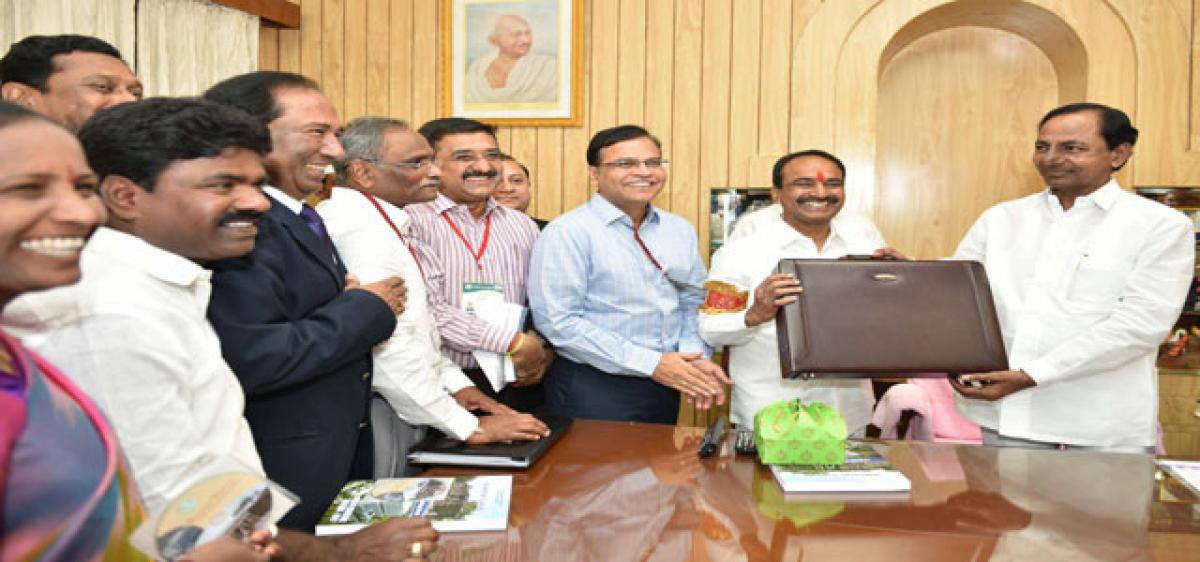Live
- Karnataka bypolls: 26.33 pc voting till 11 A.M. on three Assembly seats
- BJP's Dushyant Gautam blasts AAP for failing to handle pollution crisis in Delhi
- Who is Mohammed Kaif? - brother of Mohammed Shami who is playing in Bengal vs Madhya Pradesh Ranji Trophy match
- Cab fraud at airport generates heat on social media
- Bengaluru police operation: 64 people arrested, 140 kg of ganja seized
- Mohammed Shami in Ranji Trophy: Veteran pacer keen to prove a point; Shami’s younger brother Mohammed Kaif included in Bengal’s XI
- BBMP proposes to collect fee for garbage collection from households
- Science lab station at govt school offers experiential learning
- Akkineni Naga Chaitanya and Sobhita Dhulipala to Tie the Knot in Hyderabad on Dec 4
- Visakhapatnam Metro Rail Project will Begin after Centre's Approval, says Minister Narayana
Just In

In an attempt to strengthen its rural economy, the Telangana Rashtra Samithi (TRS) government on Monday announced several schemes in its budget to lend a helping hand to artisans and the communities engaged in different traditional occupations.
Hyderabad: In an attempt to strengthen its rural economy, the Telangana Rashtra Samithi (TRS) government on Monday announced several schemes in its budget to lend a helping hand to artisans and the communities engaged in different traditional occupations.
Presenting a development and welfare-oriented budget of Rs 1,49,446-crore, Finance Minister Eatala Rajender said the budgetary allocation for several sectors, including agriculture, power, and various welfare measures is higher over the allocations made in 2016-17. Of this the development expenditure has been pegged at Rs 88,038.80 crore.
The minister said Rs 61,607.20 crore has been earmarked under establishment expenditure which includes payment of salaries, loans and pensions. The Budget Estimates for 2017-18 indicate a revenue surplus of Rs 4,571.30 crore and a fiscal deficit of Rs 26,096.31 crore, which is 3.48 per cent of the estimated GSDP.
As provisions for the irrigation sector are treated as capital in nature, there is an increase in the Revenue Surplus. The Minister said a number of programmes are being implemented by raising resources through extra-budgetary resources, he added. Presenting his fourth budget, the Finance Minister announced several schemes for different communities in the State who are dependent on traditional occupations.
To make villages as the centres of productivity, the government has decided to provide sheep to 4 lakh people belonging to Yadava community though the Sheep Development Cooperative Societies with 75 per cent subsidy. It also proposes to grow stylo-grass in the forest lands to provide sufficient fodder for the sheep.
The minister said special financial assistance will be given to the communities depending on traditional occupations like fisheries.
The minister said Rs 500 crore has been allocated for the schemes designed for barbers to provide facilities like modernisation of saloons and construction of dhobi ghats and provision of washing machines and dryers for washermen community.
Similarly, special financial assistance will be provided to toddy-tappers, Viswakarma and other communities. To address the problems faced by weavers in the State, the Finance Minister said that Rs 1,200 crore has been allocated for the welfare of weavers, besides developing a textile park at Warangal and an apparel park in Siricilla.
Rajender said the State government has proposed to allocate Rs 1,000 crore for the Most Backward Classes (MBCs) in the State. The State has registered a strong growth in spite of relatively lower collection from stamps and registration due to demonetisation. Telangana is projected to achieve a Gross State Domestic Project (GSDP) growth of over 10.1 per cent during the current fiscal.
Glossing over the State achievements, Rajender said a number of sectors hitherto neglected have got special focus and higher allocation in budget proposals for 2017-18. The budget aims at balancing welfare measures with developmental initiatives. Accordingly, he earmarked Rs 23,675 crore for irrigation sector followed by Panchayati Raj at Rs 14,723 crore, education (Rs 12,705 crore), health (Rs 5,976 crore), roads (Rs 5,033 crore) and power (Rs 4,203 crore).
Similarly for agriculture, the Finance Minister announced an allocation of Rs 5,943 crore and Rs 4,000 crore towards fourth installment of loan-waiver scheme for the farm sector. Even if the power demand shoots up to 10,000 MW, he said the State is ready to meet such high demand.
Rajender said it is noteworthy that the expenditure proposed under the Pragati Paddu is higher than that under the Committed Expenditure. This has become possible because rationalisation of expenditure and efforts to mobilise additional resources. The Government of India has taken 2011-12 as base year for estimating GSDP. Therefore, it is expected that there will be an increase in the net borrowing limits under the FRBM Act in 2017-18.

© 2024 Hyderabad Media House Limited/The Hans India. All rights reserved. Powered by hocalwire.com







